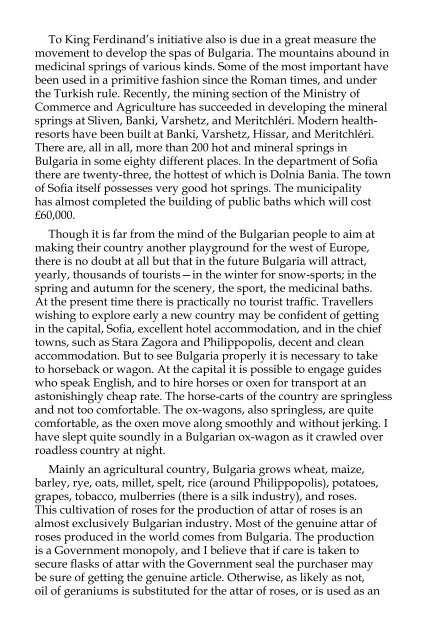Bulgaria e-book - iMedia
Bulgaria e-book - iMedia
Bulgaria e-book - iMedia
You also want an ePaper? Increase the reach of your titles
YUMPU automatically turns print PDFs into web optimized ePapers that Google loves.
To King Ferdinand’s initiative also is due in a great measure the<br />
movement to develop the spas of <strong>Bulgaria</strong>. The mountains abound in<br />
medicinal springs of various kinds. Some of the most important have<br />
been used in a primitive fashion since the Roman times, and under<br />
the Turkish rule. Recently, the mining section of the Ministry of<br />
Commerce and Agriculture has succeeded in developing the mineral<br />
springs at Sliven, Banki, Varshetz, and Meritchléri. Modern healthresorts<br />
have been built at Banki, Varshetz, Hissar, and Meritchléri.<br />
There are, all in all, more than 200 hot and mineral springs in<br />
<strong>Bulgaria</strong> in some eighty different places. In the department of Sofia<br />
there are twenty-three, the hottest of which is Dolnia Bania. The town<br />
of Sofia itself possesses very good hot springs. The municipality<br />
has almost completed the building of public baths which will cost<br />
£60,000.<br />
Though it is far from the mind of the <strong>Bulgaria</strong>n people to aim at<br />
making their country another playground for the west of Europe,<br />
there is no doubt at all but that in the future <strong>Bulgaria</strong> will attract,<br />
yearly, thousands of tourists—in the winter for snow-sports; in the<br />
spring and autumn for the scenery, the sport, the medicinal baths.<br />
At the present time there is practically no tourist traffic. Travellers<br />
wishing to explore early a new country may be confident of getting<br />
in the capital, Sofia, excellent hotel accommodation, and in the chief<br />
towns, such as Stara Zagora and Philippopolis, decent and clean<br />
accommodation. But to see <strong>Bulgaria</strong> properly it is necessary to take<br />
to horseback or wagon. At the capital it is possible to engage guides<br />
who speak English, and to hire horses or oxen for transport at an<br />
astonishingly cheap rate. The horse-carts of the country are springless<br />
and not too comfortable. The ox-wagons, also springless, are quite<br />
comfortable, as the oxen move along smoothly and without jerking. I<br />
have slept quite soundly in a <strong>Bulgaria</strong>n ox-wagon as it crawled over<br />
roadless country at night.<br />
Mainly an agricultural country, <strong>Bulgaria</strong> grows wheat, maize,<br />
barley, rye, oats, millet, spelt, rice (around Philippopolis), potatoes,<br />
grapes, tobacco, mulberries (there is a silk industry), and roses.<br />
This cultivation of roses for the production of attar of roses is an<br />
almost exclusively <strong>Bulgaria</strong>n industry. Most of the genuine attar of<br />
roses produced in the world comes from <strong>Bulgaria</strong>. The production<br />
is a Government monopoly, and I believe that if care is taken to<br />
secure flasks of attar with the Government seal the purchaser may<br />
be sure of getting the genuine article. Otherwise, as likely as not,<br />
oil of geraniums is substituted for the attar of roses, or is used as an<br />
adulterant. The rose valleys are grouped around Stara Zagora, and a<br />
visit to the farms in the flowering season—late spring—should be an<br />
incident of a Balkan tour.<br />
The exports of <strong>Bulgaria</strong> are chiefly cereals, and the imports<br />
manufactured goods of all kinds. But by a system of high Protection<br />
and bonuses efforts are being made to establish manufacturing<br />
industries in the country. The oldest <strong>Bulgaria</strong>n industry is weaving,<br />
which has existed from ancient times as a home industry. The wool<br />
of the country was worked up into cloths, carpets, braids, serges, etc.,<br />
which were in request throughout the Ottoman Empire. The most<br />
important weaving centres are Pirdop, Panaguiourichté, Karlovo,<br />
Sopot, Koprivchtitza, Klissoura, Kalofer, Gabrovo, Trevna, Sliven,<br />
Kotel, and Samokov. Under Turkish rule, these towns supplied cloth<br />
to the Imperial army. <strong>Bulgaria</strong>n cloths were then held in esteem,<br />
and there was a demand for them in Greece and in Asia Minor.<br />
In 1880 some capitalists decided to start modern workshops. The<br />
example was given by the towns of Gabrovo and Sliven, where there<br />
are now large factories, organised on modern principles. There are<br />
as many as twenty-six factories in other towns, among others, at<br />
Samokov and Kazanlik. <strong>Bulgaria</strong> holds the first place for weaving in<br />
the Balkan Peninsula. Lately, in addition to the making of woollens,<br />
cotton-spinning has been introduced, and there are several mills now<br />
working.<br />
So pronounced has been the growth of industrialism in <strong>Bulgaria</strong><br />
that labour legislation has been already found necessary. There are<br />
laws making regulations for the employment of apprentices, for<br />
the maximum number of hours in the working day, and the age of<br />
apprentices. The law of 1905 regulating the work of women and<br />
children lays down conditions for the employment of children under<br />
fifteen, and for women of all ages, occupied in factories, mines,<br />
quarries, workshops, and other industrial undertakings. Children<br />
of either sex who have not attained the age of twelve years must not<br />
be employed in factories, workshops, at pit-mouths, in quarries, or<br />
sewers. However, children under twelve, but in no case under ten,<br />
may be employed in certain undertakings. Children under fifteen and<br />
women under twenty-one cannot be employed in the subterranean<br />
parts of mines or quarries. The working day for children is limited<br />
to eight hours; night-work is forbidden to women, and to children<br />
under fifteen. On Sundays all industrial establishments must close.<br />
In addition to these laws protecting workers there are laws<br />
protecting employers against foreign competition and granting them





